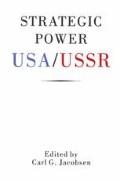Abstract
The most sophisticated American thinking about national security, derived in the 1960s from abstract game theory by Thomas Schelling, has proceeded from the assumption that there is a single, universal strategic rationality, which will be adopted by ‘any player who had his wits about him’. During the arms control heyday after the signing of SALT I, a vulgar version of that assumption held that Soviet strategic thought lagged behind the thinking of American strategists, but that this gap could be erased by using arms control negotiations to educate the Soviets. Then, the Soviet Union would come to share such American ideas as ‘killing weapons is bad, killing people is good’.1
Access this chapter
Tax calculation will be finalised at checkout
Purchases are for personal use only
Preview
Unable to display preview. Download preview PDF.
Editor information
Editors and Affiliations
Copyright information
© 1990 Carl G. Jacobsen
About this chapter
Cite this chapter
Snyder, J. (1990). The Concept of Strategic Culture: Caveat Emptor. In: Jacobsen, C.G. (eds) Strategic Power: USA/USSR. Palgrave Macmillan, London. https://doi.org/10.1007/978-1-349-20574-5_1
Download citation
DOI: https://doi.org/10.1007/978-1-349-20574-5_1
Publisher Name: Palgrave Macmillan, London
Print ISBN: 978-0-333-52567-8
Online ISBN: 978-1-349-20574-5
eBook Packages: Palgrave Political & Intern. Studies CollectionPolitical Science and International Studies (R0)

